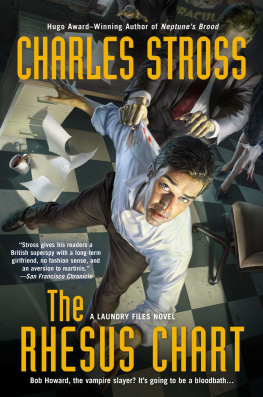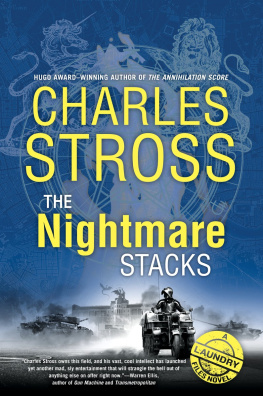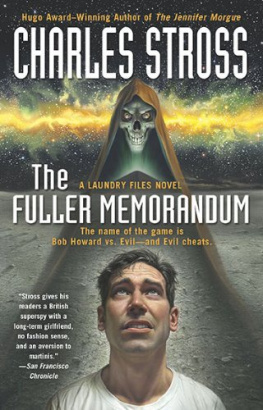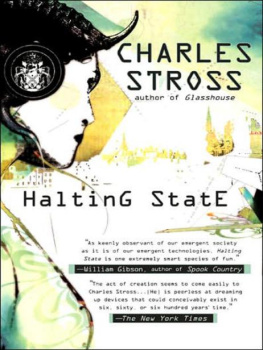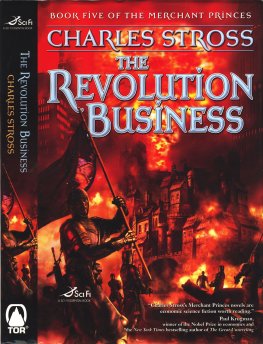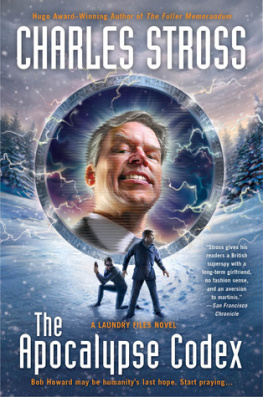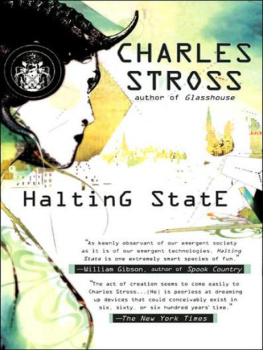Missile Gap
by Charles Stross
Gregor is feeding pigeons down in the park when the sirens go off.
A stoop-shouldered forty-something male in a dark suit, pale-skinned and thin, he pays no attention at first: the birds hold his attention. He stands at the side of a tarmac path, surrounded by damp grass that appears to have been sprayed with concrete dust, and digs into the outer pocket of his raincoat for a final handful of stale bread-crumbs. Filthy, soot-blackened city pigeons with malformed feet jostle with plump white-collared wood pigeons, pecking and lunging for morsels. Gregor doesn't smile. What to him is a handful of stale bread, is a deadly business for the birds: a matter of survival. The avian struggle for survival runs parallel to the human condition, he ponders. It's all a matter of limited resources and critical positioning. Of intervention by agencies beyond their bird-brained understanding, dropping treats for them to fight over. Then the air raid sirens start up.
The pigeons scatter for the treetops with a clatter of wings. Gregor straightens and looks round. It's not just one siren, and not just a test: a policeman is pedaling his bicycle along the path towards him, waving one-handed. "You there! Take cover!"
Gregor turns and presents his identity card. "Where is the nearest shelter?"
The constable points towards a public convenience thirty yards away. "The basement there. If you can't make it inside, you'll have to take cover behind the east wall if you're caught in the open, just duck and cover in the nearest low spot. Now go!" The cop hops back on his black boneshaker and is off down the footpath before Gregor can frame a reply. Shaking his head, he walks towards the public toilet and goes inside.
It's early spring, a weekday morning, and the toilet attendant seems to be taking the emergency as a personal comment on the cleanliness of his porcelain. He jumps up and down agitatedly as he shoves Gregor down the spiral staircase into the shelter, like a short troll in a blue uniform stocking his larder. "Three minutes!" shouts the troll. "Hold fast in three minutes!" So many people in London are wearing uniforms these days, Gregor reflects; it's almost as if they believe that if they play their wartime role properly the ineffable will constrain itself to their expectations of a humanly comprehensible enemy.
A double-bang splits the air above the park and echoes down the stairwell. It'll be RAF or USAF interceptors outbound from the big fighter base near Hanworth. Gregor glances round: A couple of oafish gardeners sit on the wooden benches inside the concrete tunnel of the shelter, and a louche City type in a suit leans against the wall, irritably fiddling with an unlit cigarette and glaring at the NO SMOKING signs. "Bloody nuisance, eh?" he snarls in Gregor's direction.
Gregor composes his face in a thin smile. "I couldn't possibly comment," he says, his Hungarian accent betraying his status as a refugee. (Another sonic boom rattles the urinals, signaling the passage of yet more fighters.) The louche businessman will be his contact, Goldsmith. He glances at the shelter's counter. Its dial is twirling slowly, signaling the marked absence of radon and fallout. Time to make small-talk, verbal primate grooming: "Does it happen often?"
The corporate tough relaxes. He chuckles to himself. He'll have pegged Gregor as a visitor from stranger shores, the new NATO dominions overseas where they settled the latest wave of refugees ejected by the communists. Taking in the copy of The Telegraph and the pattern of stripes on Gregor's tie he'll have realized what else Gregor is to him. "You should know, you took your time getting down here. Do you come here often to visit the front line, eh?"
"I am here in this bunker with you," Gregor shrugs. "There is no front line on a circular surface." He sits down on the bench opposite the businessman gingerly. "Cigarette?"
"Don't mind if I do." The businessman borrows Gregor's cigarette case with a flourish: the symbolic peace-offering accepted, they sit in silence for a couple of minutes, waiting to find out if it's the curtain call for world war four, or just a trailer.
A different note drifts down the staircase, the warbling tone that indicates the all-clear these days. The Soviet bombers have turned for home, the ragged lion's stumpy tail tickled yet again. The toilet troll dashes down the staircase and windmills his arms at them: "No smoking in the nuclear bunker!" he screams. "Get out! Out, I say!"
Gregor walks back into Regent's Park, to finish disposing of his stale bread-crumbs and ferry the contents of his cigarette case back to the office. The businessman doesn't know it yet, but he's going to be arrested, and his English nationalist/neutralist cabal interned: meanwhile, Gregor is being recalled to Washington DC. This is his last visit, at least on this particular assignment. There are thin times ahead for the wood pigeons.
It's a moonless night and the huge reddened whirlpool of the Milky Way lies below the horizon. With only the reddish-white pinprick glare of Lucifer for illumination, it's too dark to read a newspaper.
Maddy is old enough to remember a time when night was something else: when darkness stalked the heavens, the Milky Way a faded tatter spun across half the sky. A time when ominous Soviet spheres bleeped and hummed their way across a horizon that curved, when geometry was dominated by pi, astronomy made sense, and serious men with horn-rimmed glasses and German accents were going to the moon. October 2, 1962: that's when it all changed. That's when life stopped making sense. (Of course it first stopped making sense a few days earlier, with the U-2 flights over the concrete emplacements in Cuba, but there was a difference between the lunacy of brinksmanship Khrushchev's shoe banging on the table at the UN as he shouted "we will bury you!" and the flat earth daydream that followed, shattering history and plunging them all into this nightmare of revisionist geography.)
But back to the here-and-now: she's sitting on the deck of an elderly ocean liner on her way from somewhere to nowhere, and she's annoyed because Bob is getting drunk with the F-deck boys again and eating into their precious grubstake. It's too dark to read the ship's daily news sheet (mimeographed blurry headlines from a world already fading into the ship's wake), it'll be at least two weeks before their next landfall (a refueling depot somewhere in what the National Oceanic and Atmospheric Administration surveyors in a fit of uncharacteristic wit named the Nether Ocean), and she's half out of her skull with boredom.
When they signed up for the Emigration Board tickets Bob had joked: "A six month cruise? After a vacation like that we'll be happy to get back to work!" but somehow the sheer immensity of it all didn't sink in until the fourth week out of sight of land. In those four weeks they'd crawled an expanse of ocean wider than the Pacific, pausing to refuel twice from huge rust-colored barges: and still they were only a sixth of the way to Continent F-204, New Iowa, immersed like the ultimate non-sequitur in the ocean that replaced the world's horizons on October 2, 1962. Two weeks later they passed The Radiators. The Radiators thrust from the oceanic depths to the stratosphere, Everest-high black fins finger-combing the watery currents. Beyond them the tropical heat of the Pacific gave way to the sub-arctic chill of the Nether Ocean. Sailing between them, the ship was reduced to the proportions of a cockroach crawling along a canyon between skyscrapers. Maddy had taken one look at these guardians of the interplanetary ocean, shuddered, and retreated into their cramped room for the two days it took to sail out from between the slabs.



